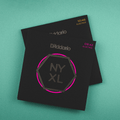What are Monel strings?
By Strings Direct – 29 August, 2023
 Monel….wasn’t he an impressionist painter? Hhhmm, close, but not quite!
You’d be forgiven for asking what on Earth Monel strings are exactly? Well, below we’ll be running you through what these lesser-known strings actually are and see what all the fuss is about… so, let’s get cracking!
Monel….wasn’t he an impressionist painter? Hhhmm, close, but not quite!
You’d be forgiven for asking what on Earth Monel strings are exactly? Well, below we’ll be running you through what these lesser-known strings actually are and see what all the fuss is about… so, let’s get cracking!
So what is Monel?
There are plenty of alloys that dominate today’s guitar string market so there's a good chance many players will never have tried (or even heard) of Monel strings before. Monel is an alloy made from a mix of Nickel and Copper. There are smaller traces of other elements in there too such as iron, manganese, carbon and silicon, however, the significant components of Monel come from its unique blend of Nickel and Copper.So what’s the significance of Monel?
Well, before steel strings were even available, players used Catgut for their guitar strings. Although the name suggests the strings were made using the guts from our furry feline friends, this wasn’t actually the case. However, that being said, Catgut did use the lining of other animal’s intestines (e.g. sheep and goat being the most commonly used)… a bit of an unpleasant thought even for the non-vegans among us!! Towards the latter part of the 19th Century, Catgut began to be replaced with steel and by the early part of the 20th century, steel strings were the norm on most guitars. But what steel was used? Well, this is where Monel strings came in to play. Monel was extremely popular at the time and was the first nickel-based string to be used by guitarists. Monel was first created by a gentleman named Robert Crooks Stanley back in 1901 whilst working at the ‘International Nickel Company’. The official term ‘Monel’ was given to the alloy and was named after one of the company presidents Ambrose Monell. It’s a trademarked alloy and as part of the trademark licensing, the ‘International Nickel Company’ were ordered to drop one of the L’s from its name because at the time companies were unable to use people’s names as a trademark name.…. You learn something new everyday, eh!What made Monel a popular choice for guitar strings?
Monel possesses several properties that made it an ideal choice for guitar strings. It’s known to have high tensile strength and is also highly resistant to corrosion too. Less breakages and less rusting!?!... these are the sort of things that many string companies continually strive to improve upon. So, why did manufacturers move away from creating Monel strings? Well, despite these desirable properties, Monel was an expensive alloy. From a business standpoint, they were costly to make so many of the brands began to search for cheaper alternatives. Not only that, musical styles were evolving and players were looking for a string that delivered a little more power, brightness and attack which led string manufacturers to develop Nickel Plated steel strings. This solution helped solve the tonal demands of the modern player and also helped bring manufacturing costs down too. Fast forward to today and Nickel Plated Steel is still the most popular alloy used. However, there are a handful of brands that have continued to manufacture or have made a conscious decision to reintroduce Monel strings to their string lineup. The good news is that it’s not just electric strings that are constructed using this alloy. Today, Monel sets are also made for acoustic and bass guitars, mandolins and violins too. We’ll take a closer look at a few of these below;Electric Sets
The Monel electric guitar sets available are made by German string makers Pyramid. Pyramid have been in the string business for over 150 years so they really know their onions when it comes to making strings. They describe their Monel strings as bridging the gap between Pure Nickel and Nickel Plated steel strings. ‘Pure Nickel’ strings typically impart a warmer tone whereas the popular Nickel Plated Steel sets of today deliver a brighter modern tone. The Pyramid set is a nice compromise between these two alloys and is described as “Vintage Bright”.... something that may sound appealing for a lot of players. Their Monel sets are also wound over a round core too which gives them that little bit more of a 'vintage' vibe. In a nutshell, round cores add a bit more flexibility and warmth to a string. If you would like a bit more information on the differences between hex core and round core strings, feel free to check out our previous blog post here.
We tested a set of the Pyramid Monel strings on a Telecaster. Typically a bright and twangy instrument, the Monel strings certainly gave this particular guitar a touch more warmth and helped to tame that twang. From a tonal and feel standpoint, after only a few minutes of playing them, this particular set felt as though they’d been played in nicely and didn’t quite have that snappy bite a new set of Nickel Plated Steel (or Stainless Steel) strings often has but they certainly weren’t dull by any stretch of the imagination either. The added benefit of the round core helped give this particular set a comfortable feel under the fingers too. Another thing we observed was that they didn’t take a long time to settle down and for their tuning to stabilise, possibly a result of Monel's higher tensile strength. Overall, a great first impression!
‘Pure Nickel’ strings typically impart a warmer tone whereas the popular Nickel Plated Steel sets of today deliver a brighter modern tone. The Pyramid set is a nice compromise between these two alloys and is described as “Vintage Bright”.... something that may sound appealing for a lot of players. Their Monel sets are also wound over a round core too which gives them that little bit more of a 'vintage' vibe. In a nutshell, round cores add a bit more flexibility and warmth to a string. If you would like a bit more information on the differences between hex core and round core strings, feel free to check out our previous blog post here.
We tested a set of the Pyramid Monel strings on a Telecaster. Typically a bright and twangy instrument, the Monel strings certainly gave this particular guitar a touch more warmth and helped to tame that twang. From a tonal and feel standpoint, after only a few minutes of playing them, this particular set felt as though they’d been played in nicely and didn’t quite have that snappy bite a new set of Nickel Plated Steel (or Stainless Steel) strings often has but they certainly weren’t dull by any stretch of the imagination either. The added benefit of the round core helped give this particular set a comfortable feel under the fingers too. Another thing we observed was that they didn’t take a long time to settle down and for their tuning to stabilise, possibly a result of Monel's higher tensile strength. Overall, a great first impression!

Bass Sets
The Monel Bass sets available on today’s market are made by top UK string manufacturer, Rotosound. Whilst Rotosound haven’t been making strings for quite as long as Pyramid, they have a long history in making top quality strings and recently celebrated their 60th Anniversary. Whilst Rotosound’s Swing Bass sets are considered to be the company's flagship bass set, their Jazz Bass flatwound range has been a staple for over half a decade. Whilst many of the other flatwound bass sets on the market today use stainless steel as their wrap wire, Rotosound’s flatwound sets use Monel and have done so ever since they were first released back in the 60’s. Rotosound say the Monel wrap helps to add more warmth to the sound whereas the tone from stainless steel can be a little harsher. Flatwound Bass strings are typically favoured by many Jazz players and those with fretless basses as they deliver a distinct deep, warm and mellow tone and also help to reduce finger noise too! Whilst they don’t tend to have the brightness or growl of a round wound set, there’s plenty of top names that have used these flatwound sets including Phil Lynott (Thin Lizzy), John Deacon (Queen), Roger Waters (Pink Floyd), Steve Harris (Iron Maiden) and many more. So if any bass players out there were tempted to try a set, you’d certainly be in good company!
Rotosound have also created a Monel flatwound set for electric guitars too. Their RS200 Top Tape set comes in gauge 12-52 and have wound 3rd string.
Flatwound Bass strings are typically favoured by many Jazz players and those with fretless basses as they deliver a distinct deep, warm and mellow tone and also help to reduce finger noise too! Whilst they don’t tend to have the brightness or growl of a round wound set, there’s plenty of top names that have used these flatwound sets including Phil Lynott (Thin Lizzy), John Deacon (Queen), Roger Waters (Pink Floyd), Steve Harris (Iron Maiden) and many more. So if any bass players out there were tempted to try a set, you’d certainly be in good company!
Rotosound have also created a Monel flatwound set for electric guitars too. Their RS200 Top Tape set comes in gauge 12-52 and have wound 3rd string.
Acoustic Strings
When it comes to looking at Monel strings made specifically for acoustic guitars, we’ll turn our attention to Martin. Martin need no introduction when it comes to guitars, and their strings are hugely popular amongst acoustic players too. Martin originally fitted Monel strings to their Mandolins but began to use them on their guitars as far back as 1922. When nickel became harder to come by, much like many other string manufacturers, Martin began to explore other materials and made the popular move towards using bronze strings.
Back in 2015, Martin reintroduced Monel strings into their product lineup and in doing so their Retro Range was born. These were designed in conjunction with bluegrass legend Tony Rice after he originally asked Martin to create a set of Monel strings especially for him. The aim was to bring out the true tone of his instrument allowing its natural character to shine through. Whilst bronze strings sound great, they can have a more ‘boisterous’ tone in comparison to nickel-based strings. As a result, some players, including Tony Rice, argue that a brighter bronze sounding string can colour and dominate the sound of the guitar, rather than allowing the natural character of the guitar to be heard.
We replaced our usual set of 80/20 bronze strings for a set of the Martin Monels on a Sigma acoustic. It’s quite unusual to unwrap a set of acoustic strings and see a silver/nickel coloured set as opposed to the familiar golden colour of bronze. Tonally, the Monel set certainly didn’t have the jangly brightness of bronze strings, although they still gave a nice projection in the upper mid-range, so they’d be more than capable of cutting through in a band situation.
Much like the electric set we tried, the mellow nature of this set made them sound and feel as though they’d been 'played in' straight from the pack. You could also play them pretty aggressively without getting the harsh overtones you often find when using a new set of brighter sounding strings.
The Retro strings have proven very popular with our customers and the wide range of gauges Martin offer help to make these a viable string for any player looking to dip their toe in the Monel string waters. We’d certainly be happy to continue to use a set on our acoustic guitars in future.
Martin originally fitted Monel strings to their Mandolins but began to use them on their guitars as far back as 1922. When nickel became harder to come by, much like many other string manufacturers, Martin began to explore other materials and made the popular move towards using bronze strings.
Back in 2015, Martin reintroduced Monel strings into their product lineup and in doing so their Retro Range was born. These were designed in conjunction with bluegrass legend Tony Rice after he originally asked Martin to create a set of Monel strings especially for him. The aim was to bring out the true tone of his instrument allowing its natural character to shine through. Whilst bronze strings sound great, they can have a more ‘boisterous’ tone in comparison to nickel-based strings. As a result, some players, including Tony Rice, argue that a brighter bronze sounding string can colour and dominate the sound of the guitar, rather than allowing the natural character of the guitar to be heard.
We replaced our usual set of 80/20 bronze strings for a set of the Martin Monels on a Sigma acoustic. It’s quite unusual to unwrap a set of acoustic strings and see a silver/nickel coloured set as opposed to the familiar golden colour of bronze. Tonally, the Monel set certainly didn’t have the jangly brightness of bronze strings, although they still gave a nice projection in the upper mid-range, so they’d be more than capable of cutting through in a band situation.
Much like the electric set we tried, the mellow nature of this set made them sound and feel as though they’d been 'played in' straight from the pack. You could also play them pretty aggressively without getting the harsh overtones you often find when using a new set of brighter sounding strings.
The Retro strings have proven very popular with our customers and the wide range of gauges Martin offer help to make these a viable string for any player looking to dip their toe in the Monel string waters. We’d certainly be happy to continue to use a set on our acoustic guitars in future.
Any other sets out there?
D'Addario are a company that always have their fingers on the pulse when it comes to string construction, and whilst they don’t produce a Monel set as such, they recently introduced their Nickel Bronze acoustic range. Rather than going down the route of creating a set wound with Monel, D’Addario opted to create something slightly different whilst indirectly giving a nod to the Nickel strings of yesteryear. The Nickel Bronze sets are wound with a nickel plated phosphor bronze wrap wire. Much like the Martin Retro strings, D’Addario say that these let the true tone of your acoustic guitar shine through, rather than your natural tone being dominated by the sound of the strings themselves. In fact, D’Addario’s tagline for the Nickel Bronze range is “Reveal what’s real”...
Another Nickel-based acoustic set you may wish to check out would be the John Pearse Pure Nickel Acoustic strings which can be found here.
The Nickel Bronze sets are wound with a nickel plated phosphor bronze wrap wire. Much like the Martin Retro strings, D’Addario say that these let the true tone of your acoustic guitar shine through, rather than your natural tone being dominated by the sound of the strings themselves. In fact, D’Addario’s tagline for the Nickel Bronze range is “Reveal what’s real”...
Another Nickel-based acoustic set you may wish to check out would be the John Pearse Pure Nickel Acoustic strings which can be found here.
Any other instruments that use Monel Strings?
We mentioned earlier that in the early days of Monel, Martin would use these strings on their Mandolins. Today, they produce an 80/20 Bronze set for those players looking for a more conventional set of mandolin strings, but their M465 set is wrapped with Monel, making them great for players looking to hark back to those earlier mandolin tones. Another mandolin set that also utilises Monel is Gibson’s Sam Bush signature Mandolin set.Conclusion
It should be said that whilst Monel strings certainly aren't all bells and whistles, this is the very attribute that adds to their appeal. Instead of being bright, brash and in your face, they impart a warm and neutral tone that's consistent and comfortable to play and they perform in the exact way they were designed to. The one thing that you may notice about the companies that produce Monel strings is that they all tend to subscribe to the big selling point that the strings are there to help bring out the natural tones and voice of your instrument as opposed to imparting some sort of mystically new and wonderful tone. Less is more is certainly the expression we'd use here. If you're a player that's concerned with the lifespan of your strings, Monel may be a new avenue you wish to explore. Nowadays, most sets are vacuum packed to prevent oxygen attacking the strings whilst sitting on the shelf, but the corrosion resistant nature of Monel also helps them from rusting whilst sitting on your guitar. If you're not a huge fan of the feel (or cost) of coated strings, Monel could be a more 'organic' option for you. Whilst it's unlikely that Monel will reach the popularity of some other alloys, it's certainly something worth trying if you're on the lookout for something a little different. After the tests we carried out, we certainly wouldn’t grumble about using them again! If you've used Monel strings in the past, feel free to leave a comment below as we'd love to hear the experiences that you've had whilst using them. Thanks for reading our blog. As always if you have any questions or comments, please leave them below. Of course, if you'd like to hear from us about anything else specific in the future, please let us know and we'll see what we can do. Thanks again, See you next time :-)





